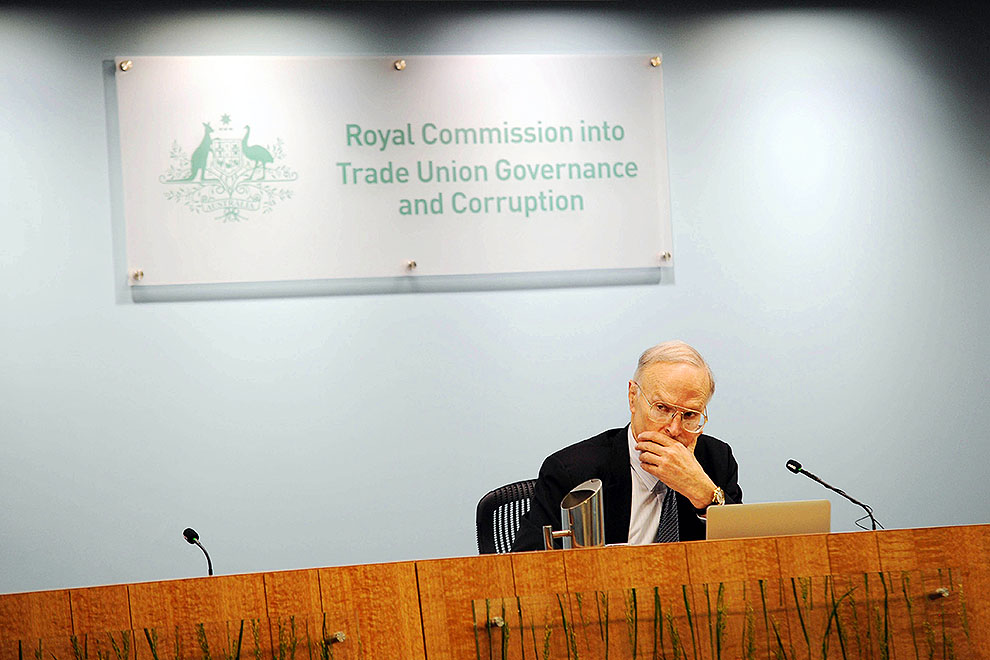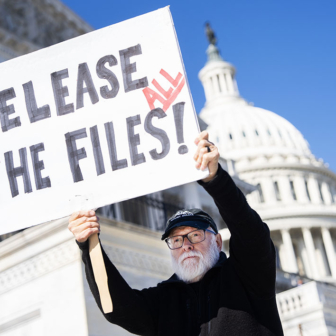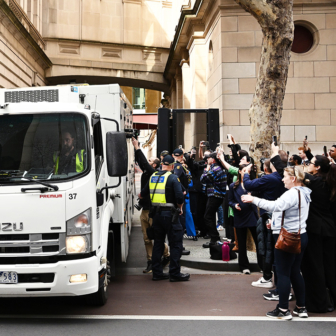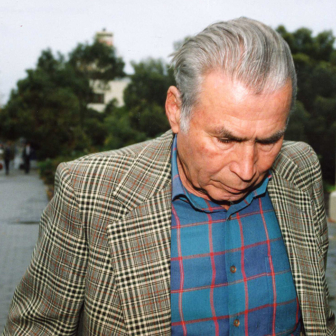Dyson Heydon isn’t the first royal commissioner to face allegations of bias, and he’s unlikely to be the last commissioner, especially in Queensland, to fall victim to the hazards of taking on extrajudicial investigations. While Heydon’s alleged transgression was undoubtedly much milder than those of some of his predecessors, it has raised again the peculiar status of the government-appointed commissions and those who agree to run them.
When Queensland premier Peter Beattie appointed Tony Morris QC to head a commission of inquiry in 2005, the job seemed clear and uncontroversial. Following a series of scandals at Bundaberg Hospital, Morris was asked to investigate the government agency concerned, Queensland Health, and its recruitment of foreign-trained doctors. A senior lawyer of many years standing, Morris could have been expected to understand and conform to the rules about bias and procedural fairness.
But the Supreme Court of Queensland eventually found that Morris’s treatment of some witnesses breached those rules to the extent that a reasonable person could regard him as biased. This is the legal test for apprehended bias – unlike actual bias, which requires proof that the commissioner or other decision-maker lacks impartiality – and it is precisely the issue that Dyson Heydon considered during the break in his commission’s hearings. In Morris’s case, the court found that his aggressive, at times sarcastic, questioning of Queensland Health bureaucrats could reasonably support suspicions that he had prejudged the issues before him.
Morris’s commission was withdrawn and a new one issued to another senor lawyer, Geoff Davies QC. Given similar terms of reference to Morris, Davies was able to review the evidence already gathered and finished off the inquiry without further incident.
The Morris commission was not the first Queensland inquiry shut down for bias. In 1996 premier Rob Borbidge’s coalition government established a commission headed by retired Supreme Court judge Peter Connolly and legal academic Kevin Ryan to investigate allegations concerning the state’s Criminal Justice Commission. After a legal challenge, the Supreme Court found that their proceedings were so tainted by bias that the commission could not proceed.
It is difficult to understand how three such highly qualified and experienced lawyers as Morris, Connolly and Ryan could fail to recognise and conform to the rules about bias. Part of the explanation might lie in the peculiar constitutional and political nature of royal commissions.
Although commissions are often referred to as judicial inquiries, they are not courts. They are arms of the executive government set up to serve government purposes. They frequently look and act like courts, and the practice of appointing judges, ex-judges or senior lawyers to run them reinforces this image. These appointments are made partly for practical reasons – senior lawyers are experienced in assessing evidence and are presumed to be aware of the impact investigations may have on individual rights – and partly on political grounds. They attract public confidence as being impartial, non-political and independent.
In all Australian jurisdictions, royal commissions have powers exceeding those of police and prosecutors, particularly the power to force witnesses to provide self-incriminating evidence and to demand that documents be handed over. Some jurisdictions now go well beyond this basic power and equip royal commissions with many other powers of investigation and detection; but even the power to require answers to questions exceeds the normal powers of police. Royal commissions also possess the freedom to adopt flexible processes, giving them a further advantage over normal criminal justice procedures, particularly because their hearings are not bound by the rules of evidence and they can act as inquisitors rather than within the constraints of the adversarial system.
For judges, former judges and lawyers well-used to courts and their rules, the shift to a different type of process is undoubtedly challenging. Even though they can’t make formal findings of guilt or innocence, royal commissions can have a major impact, especially on the reputations of people they investigate. It’s for this reason that rules requiring them to act fairly and without bias have been developed. Put simply, commissioners must not appear to have prejudged the issues before them, and they must give a fair hearing to people facing allegations.
Governments appoint royal commissions for both pragmatic and political reasons. Pragmatically, they can gather information and investigate issues that the mainstream institutions of government, such as police, prosecutors and the public service, cannot or should not address, including their own alleged corruption or inefficiency. Commissions can also have specialised expertise, a multidisciplinary or cross-jurisdictional approach, and the coercive powers other agencies lack.
Politically, governments generally appoint commissions when public, opposition and media pressure about an issue forces them to do so. By establishing a process perceived to be independent, a government can manage crises, deflect potential criticism or score points against an opponent. Another Queensland example illustrates the latter type of commission. In 1989, a month after the release of the Fitzgerald inquiry’s damning findings about the government at the time, state cabinet announced an inquiry into union behaviour – including claims of ballot rigging and financial irregularities – to be headed by Marshall Cooke QC. This was a transparent attempt to shift the focus away from Fitzgerald’s findings about the government and onto allegations concerning Labor Party–linked unions.
Governments can also resist calls for royal commissions for both pragmatic and political reasons. Pragmatically, commission inquiries can be expensive, legalistic and slow. Politically, they can be difficult to control and can stray into unanticipated areas.
Although governments use commissions because they want the inquiry process to be seen as independent, they still try to control and influence them – through the choice of commissioners and their staff, the scope of the terms of reference, the powers given to them, or their resources. Marshall Cooke’s inquiry, for instance, began under the Coalition government but was still going when Labor’s Wayne Goss was elected. After the new government withdrew resources, Cooke was reduced to working without offices and support staff. Similarly, the Costigan commission, which had been appointed in 1980 by the Fraser government, was supported by the incoming Hawke government in its inquiries into tax evasion but was denied requests for extensions of time and resources when it pressed for funding to examine links between unions, drugs and organised crime.
Other forms of government control are more insidious. In the early 1960s the National Hotel commission of inquiry, led by a future chief justice of the High Court, Harry Gibbs, investigated claims of police misconduct in Queensland, including accusations against many of the police who would later be investigated by the Fitzgerald inquiry. Although Fitzgerald would later show that there was clearly corrupt activity going on at the time, Gibbs failed to find any evidence of the alleged activities.
Gibbs was hampered by narrow terms of reference, and his lack of independent investigative staff meant that he had to rely on the colleagues of the police he was probing. He was limited to investigating after-hours drinking and the condoning of prostitution at a particular hotel during a particular period, and had no scope to examine broader events and relationships or how drinking and prostitution were policed more generally. One police investigator assisting the commission, Don Lane, was himself represented at the inquiry, presumably because his conduct was encompassed by the allegations. Later, after he had become a government minister and Fitzgerald had reported, he was jailed for corruption.
But Gibbs also imposed his own limitations. He would not accept hearsay evidence, excluded evidence he considered lacking in relevance to his terms of reference, and only accepted evidence given verbally at hearings and subject to cross-examination. In other words, he applied rules generally governing courts, thereby defeating the purpose of setting up a more inquisitorial commission.
The failure of the National Hotel inquiry is by no means unique. In a similar vein, the NSW government appointed the chief justice of New South Wales, Sir Laurence Street, to an inquiry as a result of a 1983 Four Corners program, “The Big League.” The program had made allegations against, among others, chief stipendiary magistrate Murray Farquhar and premier Neville Wran. This inquiry also suffered from terms of reference focused on very particular allegations, but in addition, according to some commentators, Street chose not to pursue evidence that would have uncovered more widespread wrongdoing because he didn’t want the inquiry politicised in the lead-up to the looming state election.
While royal commissions and equivalent public inquiries are equipped with the powers, flexible processes and independence to investigate wrongdoing, some will succeed at this task and some will not. Those that do succeed are likely to be investigating real and substantive wrongdoing and to have a strong inquiry head able to extract procedural and administrative support from a sometimes unwilling government. Successful inquiries are also likely to take an active role in the management and public presentation of information about their activities, rather than leave their work to stand for itself. The main impediments to the effectiveness of a royal commission are political manipulation by the government and the self-imposed constraint of an unduly legal and inquisitorial style of inquiry. Commissioners need to embrace their capacity to inquire broadly and not be bound by the rules of evidence. But they must also act fairly and without even the appearance of bias.
Unlike Morris, Connolly and Ryan, Dyson Heydon was not alleged to have unfairly criticised or questioned witnesses. Unlike Connolly, he has not been a private legal adviser to the government. We now know that he doesn’t regard his acceptance of a speaking engagement as sufficient reason to step aside. But his experience does show the difficult path judges take when they step outside the safe confines of their courts and accept the quite different role of commissioner. •




